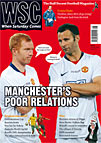 Csaba Abrahall analyses part of our regular football coverage that often goes unnoticed – the subtitles
Csaba Abrahall analyses part of our regular football coverage that often goes unnoticed – the subtitles
Losing the Champions League final was obviously a disappointment for Sir Alex Ferguson. Even so, viewers of the teletext subtitles accompanying ITV’s broadcast may have been surprised to learn that it represented his “most painful urine defeat”. Mistakes such as this are not uncommon in the subtitling of live football, not because it is the work of illiterate fools with no football knowledge, but because real-time subtitling is fiendishly difficult.
Subtitles for non-live programmes can be prepared in advance, permitting the subtitler to practise their art and present a synchronised, error-free subtitle that complements rather than detracts from the programme. But that ability is compromised on live broadcasts, where the overriding concern is to minimise the delay between utterance and appearance of the subtitle. This leads to titles being spat out, unreviewed and in an unsatisfactory word-by-word format, as quickly as possible. To achieve this, alternative input techniques are used.
When I worked on the subtitling of Channel 4’s cricket coverage, we used speech-recognition software and a method known as “respeaking”, whereby the subtitler repeats the commentators’ words before transmitting the subtitle generated. Cricket is ideally suited to this, offering the subtitler the opportunity to respeak, review the subtitle, have a cup of tea and transmit while the ball is still being lazily tossed between fielders. Subtitling the faster game of football represents more of a challenge.
The Champions League final was subtitled for ITV by ITFC, an independent media-access organisation unrelated to the identically initialled business based at Portman Road. For most live sport broadcasts, ITFC use stenography, a process in which the operator captures sounds rather than letters to produce a phonetic code from which software attempts to construct words.
Unfortunately, a combination of input errors and the English language’s disdain for consistently matching sounds with spellings can lead to inadequate transcriptions. Viewers may struggle with these, perhaps not immediately realising that “ruinry” is the chunky number ten forming part of Manchester United’s attacking “fab fur”, or that “urine” should have read “European”. However, Cherry Cole, director of media access services at ITFC, says that they “are bound by service level agreements to provide 98 per cent accuracy”, an impressive rate achieved in part through thorough pre-match preparation.
Practising obvious cliches would have paid off when Clive Tyldesley’s preamble to the Rome final predictably referenced “coliseum”, “gladiatorial” and the “neutral” Swiss referee, but more commonly a subtitler will prepare by defining short forms for proper nouns. The software will struggle to transcribe correctly a name with which it is unfamiliar – when Tyldesley mentioned former Barcelona player Rivaldo, the best the machine could manage was “Robalbo” – and so pre-programmed shortcuts are used as a more reliable means of coping with potentially problematic ones.
Preparation can create its own difficulties, however. I suspect it was an incorrectly keyed short form that led to a subtitle announcing that a shot was tipped over the bar not by Víctor Valdes but by “Terravista Airport”, the scene of a plane crash three days before the final, and therefore in the subtitler’s short-form dictionary.
A good stenographer can produce text at speeds considerably faster than speech but obviously cannot pre-empt it. Even the best live subtitles will therefore always be late and vulnerable to changing circumstances rendering them irrelevant or ridiculous. The faithful rendition of a series of names as the ball is passed around seems futile, as the subtitle can rarely be better than two or three players behind, and Tyldesley’s comment that “His [Ferguson’s] team has made a forceful start” in Rome was perfectly captured but displayed over a shot of Thierry Henry, whose team had done anything but.
Given the limitations, why bother subtitling live football at all? Essentially, broadcasters have little choice. Ofcom regulations demand that 80 per cent of a channel’s output must carry subtitles, and so three hours of television cannot be ignored. Moreover, despite the problems, it does its job. Watch a game with the sound off – not a bad idea when Tyldesley and David Pleat are the alternative – and the benefits subtitles give to the hearing-impaired audience become clear.
The Champions League final was subtitled well. The challenging post-match interview with Ferguson was handled superbly, and viewers missed nothing of an unusually erudite observation from Pleat on the relative merits of Cristiano Ronaldo and Lionel Messi in the air. The subtitler even managed to derive some sense from Teddy Sheringham. Live subtitling can never be perfect, but behind every garbled subtitle is a frustrated subtitler striving to provide a service somewhat superior to that supplied by Manchester United’s midfield that night.
From WSC 270 August 2009